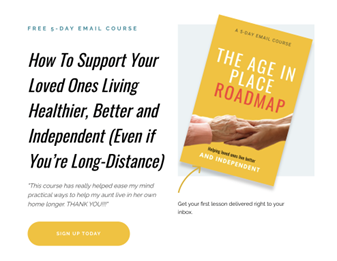Debunking 3 Common Myths About Aging & Older Adults – #3 Might Surprise You

He US Surgeon General recently published a paper on Isolation that sheds more light on the devastating effects of isolation and especially among vulnerable groups like older adults.
This epidemic of loneliness is not okay, and we want to help spread awareness and provide tangible and practical ways to prevent isolation among adults aging in place.
But first, let’s address the elephant on this screen and debunk some common misconceptions.
Debunking 3 Common Myths About Aging & Older Adults That Might Surprise You
It’s important to clarify some widespread misconceptions that might be obscuring our perspective.
Here 3 Common Myths and some truths to debunk them:
Myth # 1: Loneliness is Inevitable with Aging
Contrary to popular belief, loneliness is not an inevitable companion of aging. By fostering regular social interactions and incorporating a diverse range of activities into their weekly schedule, our aging parents can experience a vibrant and fulfilling social life. With the right support and opportunities, they can forge meaningful connections, nurture friendships, and continue to thrive socially as they age.
Myth # 2: Making New Friends at 70 is Unlikely
Dismiss this notion entirely! Age should never be perceived as a barrier to forming new friendships. Our loved ones have the capacity to cultivate new relationships at any stage of life—unless they intentionally isolate themselves. Encouraging social engagement, exploring shared interests, and participating in community events can open doors to new connections, creating a rich and diverse social circle.
Myth # 3: Seniors and Technology Don’t Mix
Let’s put this myth to rest once and for all. Older adults are more tech-savvy than ever before. Many seniors have embraced technology and are thriving in the digital realm. From using smartphones to engage with loved ones, exploring social media platforms to connect with friends, or even learning new skills online, seniors are defying stereotypes and embracing the vast opportunities that technology offers. With a little guidance and support, our loved ones can navigate the digital landscape confidently, improving their connectivity and expanding their world.
By dispelling this misconception, we can adopt a more hopeful outlook on aging. This positive perspective can assist our loved ones in accepting the advantages of technology.
Let’s unite to confront these misconceptions and foster an atmosphere that encourages active, engaged, and fulfilling lifestyles for older adults in our community.
PS: We’ve created a FREE 5-Day Email Course – it’s packed with tips and guides to supporting loved ones living independently – including a resource with 60 ideas to spark ideas for activities your aging loved ones might enjoy. (You might be interested in many of these yourself:)



